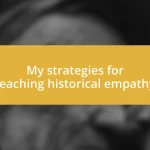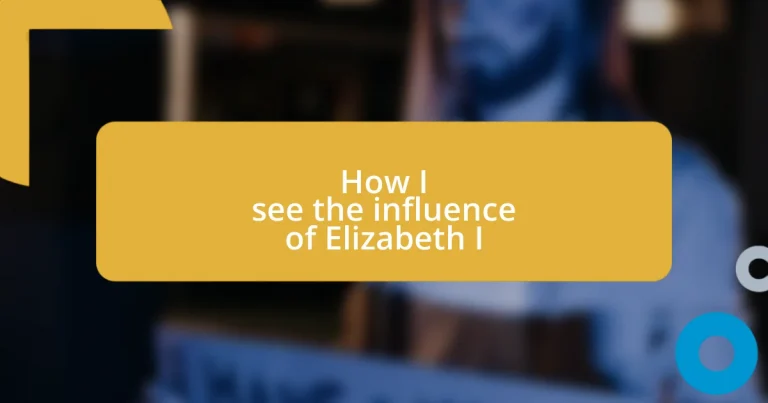Key takeaways:
- Elizabeth I established the Anglican Church, promoting religious tolerance and national unity during a time of religious strife.
- Her patronage of the arts and support for figures like Shakespeare led to the flourishing of the Elizabethan Age, influencing literature and cultural identity.
- Elizabeth I challenged traditional gender roles, demonstrating that women could wield power and authority, thereby inspiring future generations of women leaders.

Overview of Elizabeth I’s Influence
Elizabeth I’s influence permeated not just her reign, but also the very fabric of English identity. I often think about how she navigated the treacherous waters of gender politics in a male-dominated society, transforming her status into a symbol of power and strength. Can you imagine the courage it took to declare herself “married to the kingdom”? This declaration redefined the dynamics of female leadership, showing that a woman could command respect and authority.
Her impact extended far beyond politics into culture and the arts. The flourishing of English drama during her reign, particularly with figures like Shakespeare, illustrates how her support helped cultivate an era of creativity. I find it fascinating to think about how Elizabeth’s patronage not only provided financial backing but also shaped the narratives and ideologies that resonate even today. How many of us have felt inspired by the stories of complex characters who navigate their environments with wit and tenacity?
Moreover, her diplomatic prowess set a precedent for future leaders, emphasizing the importance of strategic alliances and cultural exchanges. Reflecting on Elizabeth’s legacy, I often wonder how she balanced diplomacy with a fierce sense of nationalism. It seems almost miraculous that she forged a sense of unity in a time of division, showcasing her skill in rallying people towards a common cause—something we continue to strive for in leadership today.

Key Policies of Elizabeth I
One of the most defining aspects of Elizabeth I’s reign was her approach to religion, particularly the establishment of the Anglican Church. I’ve always admired how she sought to create a middle ground that could appease both Catholics and Protestants, managing an intricate balance that was no simple feat. This was not merely a political maneuver; it represented a genuine desire to foster unity in a nation torn apart by religious strife. Her policies included:
- The Act of Supremacy (1559), proclaiming her as the Supreme Governor of the Church of England.
- The Act of Uniformity (1559), which established the Book of Common Prayer as the standard for worship.
- A focus on tolerance, allowing for a degree of religious freedom that was quite progressive for the time.
Elizabeth’s foreign policy was equally significant, characterized by shrewd diplomacy and military strategy. I can’t help but feel a sense of awe when considering her ability to navigate foreign alliances, especially with Spain. Her support of Protestant states in Europe, coupled with her strategic use of privateers like Sir Francis Drake, reflected a profound understanding of the geopolitical landscape. Here are some key elements of her foreign policy:
- A strong stance against Spanish aggression, culminating in the defeat of the Spanish Armada in 1588.
- Diplomatic relationships with Protestant nations like France and the Netherlands to counterbalance Catholic power.
- Support for the arts and trade, which bolstered England’s influence and economy on the global stage.
I think it’s incredible how these policies not only shaped England’s future but also showcased Elizabeth’s capabilities as a leader who understood both the power of diplomacy and the necessity of strength.
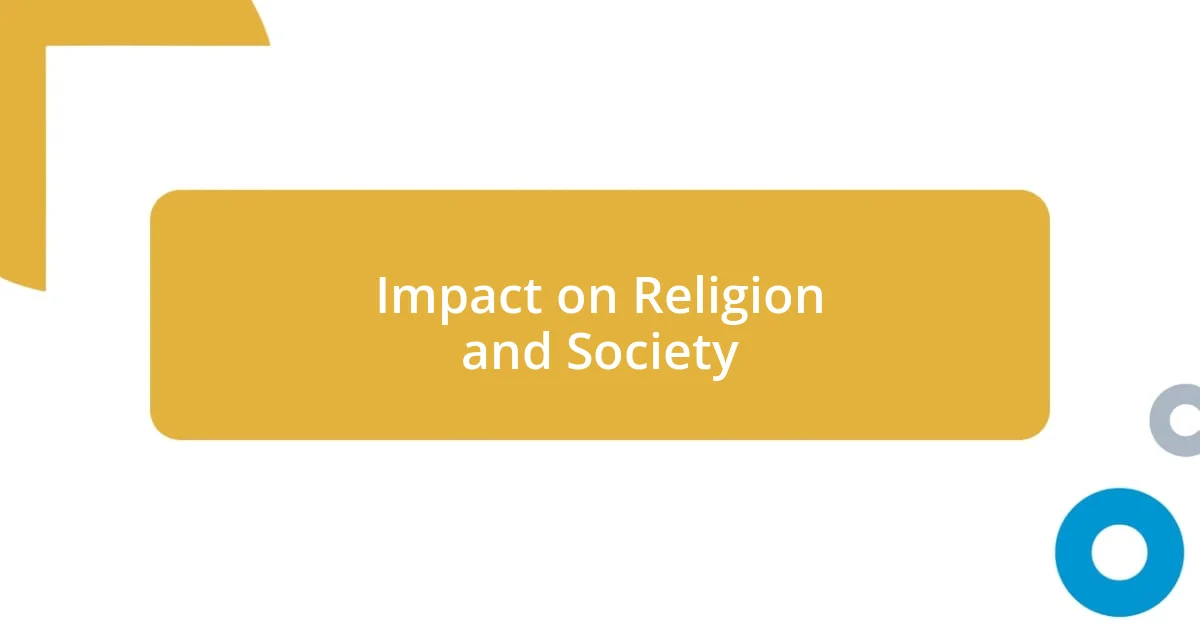
Impact on Religion and Society
Spaning the complex landscape of Elizabeth I’s reign, her influence on religion and society profoundly resonated throughout England. She championed the establishment of a Protestant nation that fostered a degree of religious tolerance, something I find particularly enlightening. The way she implemented the Act of Supremacy and the Act of Uniformity not only marked her authority but also represented a delicate balance between two polarized factions. It’s intriguing how her leadership style resonated with a sense of pragmatism. Can you imagine being in her shoes, tasked with uniting a kingdom rife with conflict? That’s a challenge that few could manage.
Furthermore, Elizabeth’s influence extended into societal norms, allowing her to reshape public perception of faith. I often think about how her reign encouraged a sense of national identity that intertwined with religious beliefs. People began to view themselves as part of a unique English identity, distinct from Catholic Europe. This shift must have been empowering for many. For instance, I recall a conversation with a historian who described the period as a “cultural awakening,” where national pride surged hand-in-hand with a newfound sense of belonging to a religious community that had its own tenets.
Consider also how Elizabeth’s policies laid the foundation for the later Puritan movement. Her effort to accommodate both Protestant and Catholic practices in the Anglican Church led to debates that would continue to shape English society long after her death. Reflecting on this, I can’t help but appreciate how nuanced her approach was. It wasn’t just about power; it was about being an agent of change in a society struggling to reconcile its fragmented beliefs. How often do we see leaders today with such a capacity for empathy and insight? Here is a comparison of her impact on society and religion:
| Aspect | Impact |
|---|---|
| Religion | Established the Anglican Church, fostering both Protestant identity and moderate Catholic tolerance. |
| Society | Encouraged a sense of national identity that blended with religious affiliation, giving rise to cultural pride. |

Elizabeth I and Gender Roles
Her reign truly challenged the traditional gender roles of the time. Elizabeth I exemplified the idea that a woman could wield power and authority just as effectively as any man. I often think about how radical her position was, reigning in a male-dominated society where women were largely viewed as subservient. It’s fascinating to consider the tension she must have faced; she had to navigate through both admiration and skepticism, proving time and again that her intellect and strategy surpassed that of many of her male counterparts.
The image of the “Virgin Queen” played a significant role in reshaping perceptions of women in leadership. By presenting herself as married to her kingdom, Elizabeth subverted expectations. It makes me reflect on how powerful it is to redefine societal narratives. Rather than conforming to the archetype of a submissive woman, she embodied strength and independence, sending a strong message that women could be both powerful and principled. Don’t you think her charisma and intellect challenged a narrative that had persisted for centuries?
Moreover, Elizabeth’s reign sparked conversations around women’s roles beyond the court. For instance, think about how her success influenced women’s education and rights in the long term. I find it remarkable to consider the ripple effects of her leadership. Just imagine young girls in that era, witnessing a queen who didn’t just rule but thrived. This instigated dreams and aspirations that might have seemed unattainable before. Wouldn’t it be exciting to think about how her legacy encouraged generations of women to break boundaries?
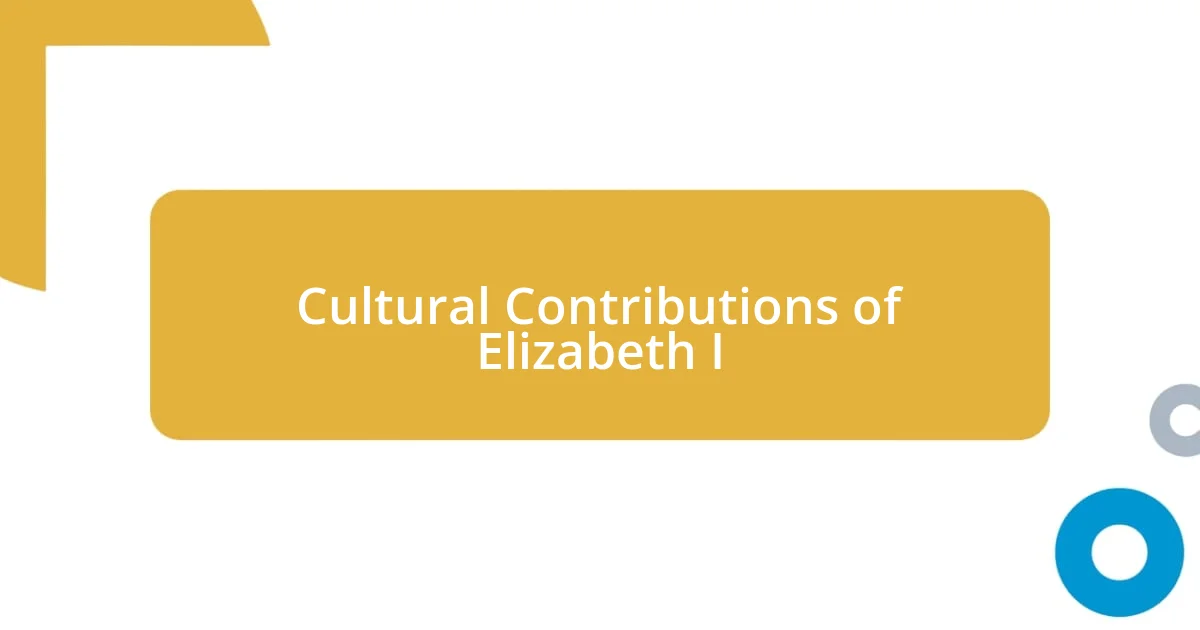
Cultural Contributions of Elizabeth I

Cultural Contributions of Elizabeth I
Elizabeth I’s reign blossomed as a remarkable period for the arts and literature, giving rise to what we now recognize as the Elizabethan Age. I find it exhilarating to think about how she patronized artists, poets, and playwrights, with figures like William Shakespeare flourishing under her rule. It’s almost as if Elizabeth understood the profound impact of culture in shaping national identity—a strategy that would foster pride and unity among her people. When I read Shakespeare’s works, I often ponder how Elizabeth’s support offered a platform for creativity that resonated far beyond the theater, influencing English literature for centuries.
The era also saw developments in music and fashion, with Elizabeth at the helm displaying a fascination for opulence that has left a lasting mark. I can vividly imagine the grand court performances and the eclectic mix of styles that defined the period. Have you ever considered how her fashionable attire, such as the iconic ruff and elaborate gowns, symbolized power and status? It’s fascinating to see how these choices transcended mere aesthetics, as they crafted an image of a strong and formidable leader. I feel that her bold style choices were not just about vanity; they were strategic, reinforcing her authority and sex appeal.
Moreover, Elizabeth’s commitment to education indirectly propelled English society towards greater awareness and enlightenment. I often reflect on her establishment of the Royal Exchange and the emphasis on trade and exploration. This not only diversified the economy but also expanded intellectual horizons, as new ideas flowed in from abroad. Imagine the thrill of discovering new lands and cultures during her reign! I believe that her thirst for knowledge played a crucial role in shaping England into a global player, setting the stage for future generations to embrace exploration and learning. It’s inspiring to think about how one ruler’s vision can ripple through time and influence countless lives.
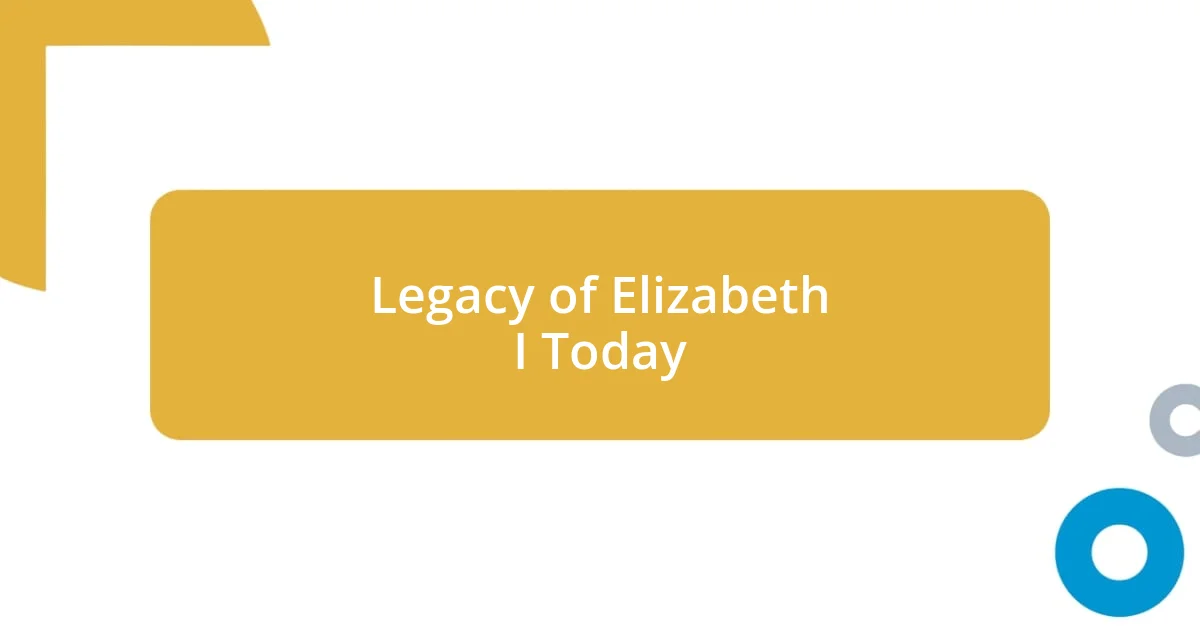
Legacy of Elizabeth I Today
The impact of Elizabeth I’s reign can still be felt today, particularly in how women view leadership roles. I often think about my own journey as a woman in a professional setting and how I draw inspiration from her story. Just the idea that a queen once fought tooth and nail against societal norms makes me feel empowered. Can you relate to that sense of motivation? It’s a reminder that the barriers women face today can be challenged and broken, just as Elizabeth did centuries ago.
Moreover, her cultural legacy continues to breathe life into art and literature in contemporary society. I remember attending a Shakespearean play and being struck by how these works resonate even now. Elizabeth’s patronage enabled the arts to flourish, creating narratives that still challenge and inspire us. Don’t you find it amazing how her support allowed for the lasting power of storytelling? It elevates our understanding of history by showing us that cultural foundations remain relevant, shaping our view of the world.
Even in our everyday lives, the principles she embodied—intellect, independence, and audacity—still serve as a guiding light. I often reflect on how her approach to governance, particularly her strategic diplomacy, can inform modern politics. When I read about her navigations through international relations, I can’t help but wonder: what if leaders today embraced her blend of strength and shrewdness? Her legacy invites us to envision a different narrative, one where leadership transcends gender and reshapes our collective future.

Lessons from Elizabeth I’s Leadership
Lessons from Elizabeth I’s Leadership
Elizabeth I’s leadership style embodies a powerful lesson in balancing authority and approachability. She was known for her ability to connect with her subjects, often engaging with them through speeches and public appearances. I often reflect on how this human touch could be a transformative element in today’s corporate environments. Isn’t it interesting to think about how a simple smile or a thoughtful conversation could foster loyalty and trust among a team?
Another striking aspect of her leadership was her exceptional adaptability. Faced with multiple threats—be it political instability or external wars—Elizabeth remained resilient, skillfully navigating challenges. I remember once dealing with a project that seemed insurmountable at first glance. It was her example of perseverance that encouraged me to rethink my approach rather than retreat. How often do we let fear dictate our courage? Elizabeth teaches us that courage often lies in the willingness to shift gears and face uncertainty head-on.
Lastly, her commitment to education and intellectual growth illustrates the importance of lifelong learning. I think about my own pursuit of knowledge and how crucial it has been for my personal and professional development. Elizabeth believed in the power of informed decision-making, and that resonates with me. Are we not all capable of becoming better leaders when we continuously seek to expand our understanding? In embracing her legacy of inquiry and learning, we can pave paths that lead us to innovative solutions and greater resilience in our own lives.










